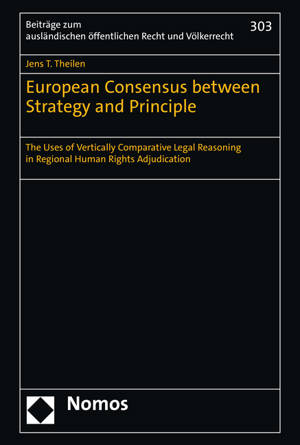
Bedankt voor het vertrouwen het afgelopen jaar! Om jou te bedanken bieden we GRATIS verzending (in België) aan op alles gedurende de hele maand januari.
- Afhalen na 1 uur in een winkel met voorraad
- In januari gratis thuislevering in België
- Ruim aanbod met 7 miljoen producten
Bedankt voor het vertrouwen het afgelopen jaar! Om jou te bedanken bieden we GRATIS verzending (in België) aan op alles gedurende de hele maand januari.
- Afhalen na 1 uur in een winkel met voorraad
- In januari gratis thuislevering in België
- Ruim aanbod met 7 miljoen producten
Zoeken
European Consensus between Strategy and Principle
The Uses of Vertically Comparative Legal Reasoning in Regional Human Rights Adjudication
Jens T. Theilen
€ 130,95
+ 261 punten
Omschrijving
This study offers a critical account of the reasoning employed by the European Court of Human Rights, particularly its references to European consensus. Based on an in-depth analysis of the Court's case-law against the backdrop of human rights theory, it will be of interest to both practitioners and theorists.While European consensus is often understood as providing an objective benchmark within the Court's reasoning, this study argues to the contrary that it forms part of the very structures of argument that render human rights law indeterminate. It suggests that foregrounding consensus and the Court's legitimacy serves to entrench the status quo and puts forward novel ways of approaching human rights to enable social transformation.The work was awarded the Hermann Mosler Prize of the German Society for International Law.
Specificaties
Betrokkenen
- Auteur(s):
- Uitgeverij:
Inhoud
- Aantal bladzijden:
- 497
- Taal:
- Engels
- Reeks:
- Reeksnummer:
- nr. 303
Eigenschappen
- Productcode (EAN):
- 9783848780914
- Uitvoering:
- Hardcover
- Afmetingen:
- 162 mm x 32 mm
- Gewicht:
- 780 g

Alleen bij Standaard Boekhandel
+ 261 punten op je klantenkaart van Standaard Boekhandel
Beoordelingen
We publiceren alleen reviews die voldoen aan de voorwaarden voor reviews. Bekijk onze voorwaarden voor reviews.









